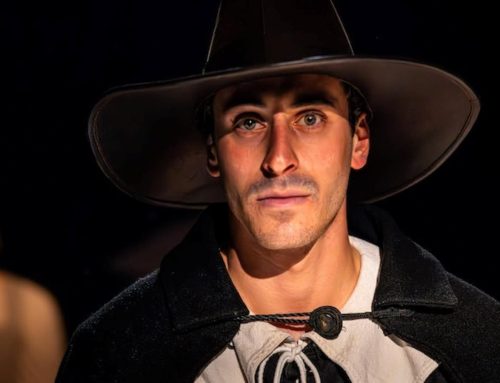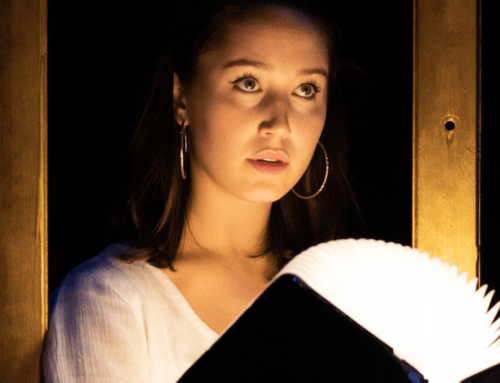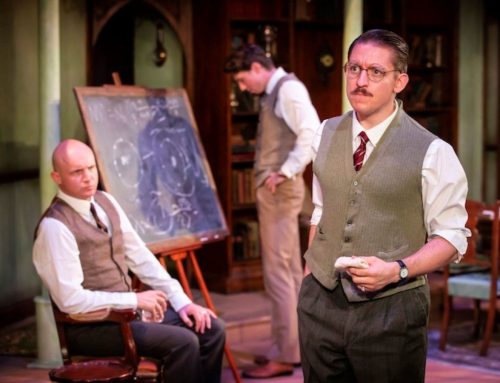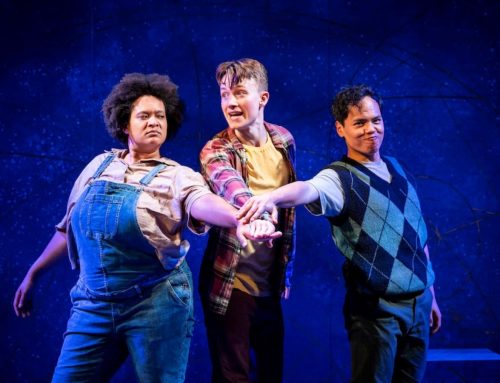Tom Ratcliffe’s Evelyn has some interesting things to say about vigilante mentality, but they are drowned out by unlikely plot contrivances.
27 June 2022 Press Night
I get the impression that Evelyn’s writer, Tom Ratcliffe, probably had a scary run-in with a seaside Punch and Judy show when he was an impressionable child.
He certainly places a very creepy Punch and Judy on stage, in the form of bemasked actors, at regular intervals in this untidy and under-developed thriller. The couple’s function is to deliver elements of the play’s backstory, which happen to mirror some of least child-friendly elements of the traditional seaside marionette show. By which I mean the baby-bashing and wife-thumping that previous generations of seaside visitors enjoyed seeing Punch dole out.
Ratcliffe’s most obvious target in this play is vigilantism. He also uses the life-size Punch and Judy, together with co-conspirator Crocodile (whose Jamaican patois seemed a little unexpected in sleepy Walton-on-the-Naze) and a musician cum stage-character I assume is the Hangman, to represent a feral vigilante-style mob.
Using puppetry as a narrative tool is not altogether a bad idea, but it is let down here by execution that is sometimes so clunky as to be embarrassing.
Having your plot devices whack each other with fabric sausages and engage in pantomime-style badinage with the audience might work in a satire, but it does not obviously build the kind of tension necessary for a thriller to function.
Much the same awkwardness marks the rest of the play, which sees some interesting themes struggling in vain to emerge from the haze of a laboured plot, unlikely character choices, storylines that go nowhere, and pedestrian direction from Madelaine Moore.
Rula Lenska struggles to find much to work with in the role of Jeanne, the spliff-smoking and occasionally foul-mouthed occupant of a seaside sheltered housing complex.
Cast aside by estranged daughter Harriet, aging Jeanne wants to rent out a room in her house for some company and some extra pin money. But there are strict rules in place that bar non-relatives from staying at the oldies housing complex.
So, when a stranger called Sandra turns up in response to Jeanne’s accommodation advert, apparently on the run from an abusive husband, the younger woman reluctantly agrees to a plan to hoodwink caregiver Laura into thinking one is godmother to the other.
So far, so unlikely. From the audience’s perspective Sandra has no obvious motivation for choosing to live with an old woman, and no apparent reason for being in Walton-on-the-Naze in the first place. But the plot demands it, so here we are.
Things soon get even more forced.
For reasons we never really understand, the deeply unlikeable Laura takes an antipathy to the newly arrived Sandra, who for equally incoherent reasons has taken to rifling Jeanne’s drawers and dressing up in her kimono. Oh, and she is also lying about her job and dating Laura’s brother, Kevin. And then Punch and Judy come on again. Hey-ho.
While all this is happening local vigilante gossips on the local website ‘Spotted Over Walton’ are spreading the news that the much-hated Evelyn Mills, nationally notorious for providing an alibi for her child-killing husband, is now living in a seaside town under a new identity.
Cue a dawning realisation on Laura’s part (or is it just in her imagination) that scars on Sandra’s wrists look a lot like the ones the eponymous Evelyn is supposed to have.
Could it be that the rapidly dementing Jeanne has invited a viper into her nest? And what might be Sandra’s role in the unexpected disappearance of Laura’s own child?
The central plot driven narrative, with lots of people lying to each other about lots of things, certainly has some potential for dramatic tension.
The main problem with Evelyn is that from beginning to end it feels like the characters know things about each other that we do not, which means they take decisions that make no sense and react to events in ways that verge on baffling.
Why would Sandra so wholly engage with the fiction of being Jeanne’s god-daughter? Why would Jeanne invite a total stranger into her home? Why would characters not call the police when faced with vigilante action? Why would anyone assume Sandra is manipulative in the absence of any such evidence?
Actions and sub-plots make no sense. The ending fizzles into nothingness and the characters end up pretty much where they started. Even the identity and nature of Sandra / Evelyn figure is unresolved, despite a final fourth-wall breaking scene there has little connection with anything that comes before.
Nicola Harrison tries hard as Sandra, as does Offue Okbegbe as Kevin, but it is Yvette Boakye who salvages the most she can from an underwritten part.
Inside Evelyn there is actually quite a good play trying to get out. It is a shame we never see it.
Director Madelaine Moore
Costume Designer Trynity Silk
Set Designer TK Hay
Assistant Director Lou Corben
Lighting and Video Designer Rachel Sampley
Yvette Boakye Laura
Michael Crean
Nicola Harrison Sandra
Rula Lenska Jeanne
Offue Okbegbe Kevin
Duration: 2 hours, 10 minutes. One interval.
Full Disclosure: I paid full box-office price for the ticket.
More Recent Reviews
Playfight. Soho Theatre.
Writer Julia Grogan’s breathtakingly assured debut play arrives at Soho Theatre following stellar reviews at the Edinburgh Fringe and [...]
All The Happy Things. Soho Theatre.
Naomi Denny’s three-hander comedy-drama All The Happy Things covers familiar themes within a recognisable premise. A grieving protagonist comes [...]
Telly. Bread and Roses Theatre.
The challenge with absurdist comedy is that many people do not find it funny. Laughing at the sheer weirdness [...]





